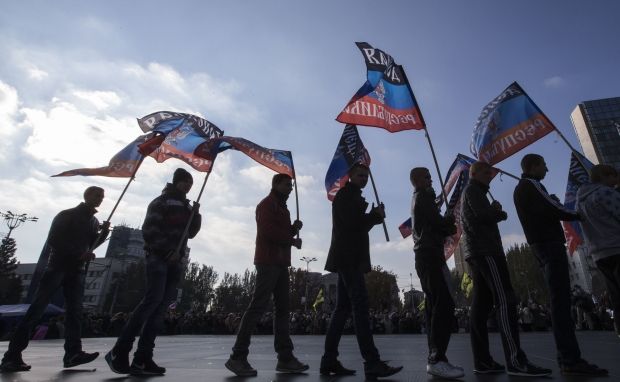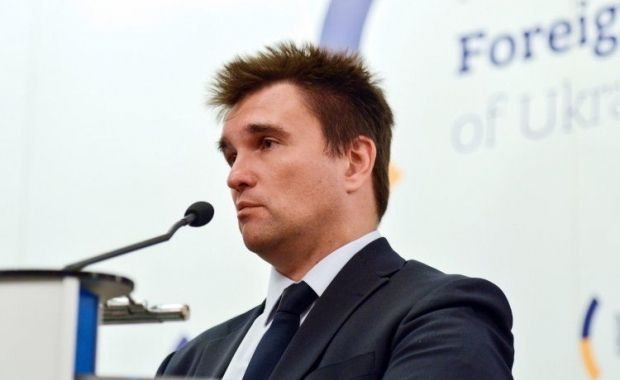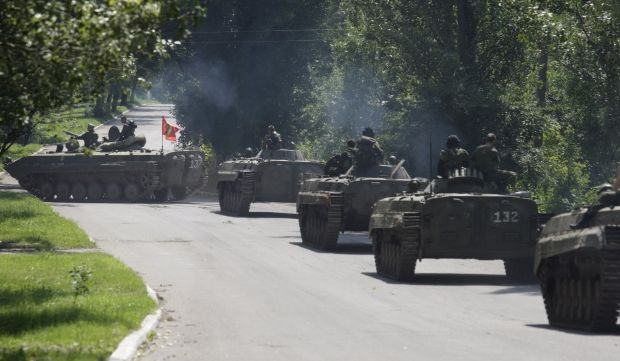
Special elections for "special" Donbas
While the Ukrainians have not yet had time to "digest" the issue of postponement of the pseudo-elections in the occupied areas of Donetsk and Luhansk regions to the next year, the Parliament has already started discussing the need to pass a special draft law regulating such vote in the future.
The pseudo-elections, previously scheduled by the self-proclaimed leaders of the so-called "DPR" and "LPR" for October 18 and November 1, have been postponed to February 21, 2016. This was the result of the Normandy Four talks in Paris and consultations in Minsk. Anyway, this is the way the situation is explained by the self-proclaimed "leaders" of the separatists. "We are pleased to note that the proposal of the “LPR” to postpone the elections in Donbas to February 21, 2016 is taken into account by the Normandy Four, on condition that Kyiv fulfills political provisions of the "Minsk-2" [agreement]... [we] inform on the consent of “DPR” and “LPR” on the postponement of elections from October 18 and November 1 to the next year," reads a Tuesday's statement by the representatives of the “DPR" and "LPR" in the Minsk talks Denis Pushilin and Vladislav Deynego.
The terrorists believe Ukraine "will be obliged to fulfill all the obligations undertaken under the Minsk Agreement, in particular, on providing a special status to Donbas, banning prosecution and punishment of participants in the events in the Donetsk and Luhansk regions," as well as re-voting the Constitutional amendments in a new version, agreed with the militants. The "DPR" and "LPR" say they are ready to engage in a drafting a special law on elections.
One may argue about the "obligations" of Ukraine. Deputy Foreign Minister Vadym Prystaylo stated on Wednesday at a meeting of the parliamentary committee that Ukraine bears no legitimate obligations under the Minsk Agreement, because the document does not have a status of an international treaty. However, discussions on a new electoral law for the "special" areas are already being held both in the parliament, and in the Central Election Commission, but with the very different messages regarding the remaining provisions of the agreement. In particular, according to the representative of Ukraine in the Tripartite Liaison Group Roman Bezsmertny, amnesty can only be introduced after the elections, in accordance with the Ukrainian legislation. "Pardon can be granted on the basis of the existing law of 1996 and the law on the local government in some areas of Donbas," he said.
Bezsmertny also stressed that, even if separatists meet all conditions, those who have committed war crimes and crimes against humanity will bear criminal responsibility anyway.
The law is not a panacea
With regard to the vote in Donbas, head of the Central Election Commission Mykhailo Okhendovsky said: "Local elections in certain areas of Donetsk and Luhansk regions could only be held according to the Ukrainian legislation, in compliance with generally accepted international electoral standards." "This requires, in particular, freedom of political parties and local mass media, freedom of campaigning, equal opportunities for each candidate. Only under these conditions, the results of elections in certain areas of Donetsk and Luhansk regions will be recognized in Ukraine and abroad," said the head of the CEC.
According to Oleksandr Chernenko, MP from the Bloc of Petro Poroshenko, drafting such bill may start after the local elections are held in Ukraine on October 25. "Our challenge now is to adopt a high-quality law before the end of the year so that the Ukrainian side fulfilled the Minsk agreements. Holding the elections in Donbas] will then depend on withdrawal of [Russian] troops and sealing the border," said the deputy.
The lawmaker said that the bill should stipulate participation of the Ukrainian parties, management of elections by the Ukrainian election commissions, free access of the Ukrainian media, opportunity to vote for IDPs from Donetsk and Luhansk regions. He emphasized that persons involved in committing grave crimes must not be eligible for being elected.
In turn, Minister of Foreign Affairs of Ukraine Pavlo Klimkin noted that, according to all the criteria of international law, holding the elections is not possible in the territory where armed foreign troops are present: "How can we hold elections when there are tanks and armed people on the streets of Donetsk and Luhansk?”

According to him, the first step toward withdrawal of foreign tropps from occupied Donbas would be granting access to this entire territory of the OSCE representatives. "If it doesn’t happen, we’re not talking about any elections," the minister said.
A diplomatic victory with some reservations
After the announcement on elections’ postponement, the rumors began spinning in the occupied territories faster than ever of Russia totally giving up on the two breakaway “republics.” A Ukrainian expert community has been divided in their evaluation of events.
Thus, according to political strategist, director of Berta Communications, personal and strategic consulting company, "the postponement of elections by militants is a great diplomatic victory of Ukraine." In fact, everything has been leading to this result, but the expert believes that there will be no elections in Donbas for a long time. "It’s not just a delay; there will be no elections at all... I think that no kind of elections should be held in Donbas now, until the separatist infection is healed and until Ukraine restores control over its border... Ukraine should take full control of the Ukrainian-Russian border, that is, our border guards and the army should overtake positions at the state border, that’s when the elections may be held. But the thing is that Russia is not going to go anywhere, it will try to drag the process, the Russians minimize their presence, but they’re still there. So I think that no elections will be held in Donbas soon," says Berezovets.
"Nobody wanted these elections. And this was not a decision taken by the militants, it was Putin’s decision," he said.
According to the expert, this decision is based on several processes. Firstly, the Russian president wants Western sanctions to be lifted. To this end, he held talks with U.S. President Barack Obama in New York. However, Obama did not go for any concessions. Secondly, the Dutch investigative report into MH17 tragedy will be released on October 13, which is projected to accuse Russia's armed forces of downing the plane. "So, Putin is now going for all sorts of concessions, sending various signals so that the report was not published in full ... So that the blame was put on some ‘abstract forces,’” said Berezovets.
Actually, all the latest developments in Donbas are tied with these processes.
In turn, Volodymyr Horbach, political analyst, expert at the Institute of Euro-Atlantic Cooperation, also hails the militants’ statement on postponement of the election. "On the façade it looks like it has been done under the pressure of our diplomacy, or under the pressure of the Ukrainian position. But in this case, the militants are not the subject of a decision: the decision was made by Russian President [Vladimir] Putin at the Noramndy Four meeting in Paris, and it was later simply articulated by the militants. This negotiating position was apparently exchanged for the extension of the Minsk agreement for another year, but it does not bring us to some kind of solution to this problem," said Horbach.
Postponement of the elections does not solve the problems of Donbas
Adopting a draft law on Donbas elections is not a solution, either. Given that the local elections in Ukraine will be held on October 25, while it’s impossible for obvious reasons to organize this process under the Ukrainian regulations in the occupied territories in these terms, a special law is just an objective necessity. But it’s only if Ukraine is really going to hold elections there. "For these elections to be clean, transparent, democratic, in line with the OSCE standards and to be really considered legitimate, the occupation forces must be withdrawn, of course. I would suggest the so-called army corps of the “DPR" and "LPR" also be pulled back across to the Russian side of the border,” said Volodymyr Horbach. “But for the holding of elections under the supervision and auspices of the OSCE, goodwill is needed, primarily the will of the occupier. However, it’s naïve to count on it. The knot is tied tightly, and it will be very difficult to resolve the existing problem. It won’t be easy and, what’s most important, it won’t be fast.”

Director of the Center for Civil Society Studies Vitaly Kulyk echoes this idea. "The postponement of pseudo-elections means the delay of a solution to the package of problems in Ukrainian-Russian relations, namely the problem of the occupied areas of Donbas. I don’t think this is a great achievement, because it was obvious from the very beginning that these "elections" are a fake. And if the Russians are going to bargain with the EU, then by holding such pseudo-elections they would actually run into some new set of sanctions against them. This was announced by the Europeans. But the proposal for a "Morel Plan" contributes to the realization of Russia’s strategic objective – pushing the occupied Donbas back into Ukraine. Given that we do not get control over this part of Ukraine," he said.
The expert notes that the abolition of the pseudo-elections does not mean regaining control over the border: "This is not demilitarization, this is not a withdrawal of weapons and troops, this is not the restoration of constitutional sovereignty in occupied territory, and this is not the solution to the Crimean issue. That is, Ukraine gets no significant preferences in this situation."
Without a reintegration mechanism
At the same time, he said, there is a risk that external actors will impose holding the quasi-elections in the occupied territories, which would be simply creating an appearance that the Ukrainian party participated in the electoral process. "Everybody will pretend that the candidates for heads of village heads or local deputies are elected, while in fact there will be an appointment of administrations in various settlements by terrorists and separatists... And then we will have to deal with those persons as the official leaders of local government - this is a great danger for Ukraine," says Kulyk.
In this regard, the expert notes that, until Ukraine regains its presence, until the State carries out de-separatization in the region and punishes those responsible for holding a so-called “referendum,” the people who actively promoted separatism and participated in hostilities, "it’s counterproductive and premature” to be considering holding any elections." "And if the authorities will strike a deal in this direction, they may face significant civil resistance and a deep political crisis," said the analyst.
However, according to political strategist, director of the Third Sector Center Andriy Zolotaryov, there can be problems even with the very adoption of a special law on elections in Donbas. "Obviously, the game is continuing. Postponement of the "elections" in Donbas is certainly a positive step, but it’s too early to give it some sort of strategic importance. This is a tactical step of demonstrating good intentions. The militants agreed to postpone the elections, however it’s too early to talk about some kind of victory, as a very difficult process of the adoption of a special law on the Donbas elections is still ahead," he said.
On the one hand, it is clear that such draft law must be adopted in line with the Constitution of Ukraine. On the other hand, it should provide for the system of immunity, i.e. pardon for militants. "This can cause a very sharp conflict in the Verkhovna Rada, and therefore I believe it will be far from easy for Rada to pass this bill... In addition, the implementation of the Paris agreements can result in a very tense internal political crisis," said the expert.
"While we are talking about the elections, no one thinks about how we are going to hold these elections. I have hard time imagining the Ukrainian parties, for example the Svoboda party, participating in the electoral process... The most difficult thing is building a dialogue, find common values with the local people and change their attitudes," said Zolotaryov.
According to him, today a significant part of the population in Donbas sees Kyiv as an enemy and dreams of being apart from Ukraine. But even if we consider this sociology, most of the population of Donetsk and Luhansk regions is ready to accept any authority that will bring at least some kind of peace and order and meet their basic needs. Before holding elections, it is important to start a dialogue on this issue. Otherwise, too many questions arise as to how to actually reintegrate the region after the elections.
Kostiantyn Honcharov, Tatiana Urbanskaya

